- Home
- Pat Conroy
The Boo
The Boo Read online
The Boo
DEDICATION
THE SOUTH CAROLINA CORPS OF CADETS
CHARLESTON, S. C.
SUBJECT: Dedication of the 1964 SPHINX
To: LT. COLONEL THOMAS NUGENT COURVOISIE
To select one individual who best represents our theme is the job of the 1964 SPHINX Staff. With great pride and satisfaction we announce our decision to dedicate this 1964 SPHINX to LT. COLONEL THOMAS NUGENT COURVOISIE.
A native of Savannah, Georgia, Thomas Courvoisie entered The Citadel in September, 1934. After three years, he was honorably discharged, returning in 1950 as a veteran student and graduating a member of the Class of 1952.
After his graduation, Lt. Colonel Courvoisie taught at various posts throughout his army career, joining The Citadel faculty as associate Professor of Military Science in 1959. While at The Citadel, he voluntarily accepted duties as the faculty leader in a number of cadet activities. In 1961, he was awarded the Army Commendation Medal for meritorious service.
Appointed to the post of Assistant Commandant of Cadets upon his retirement from active Army service in 1961, Lt. Colonel Courvoisie has the distinction of being a favorite of the Corps while representing the authority which must enforce its discipline. Let the 1964 SPHINX stand as a tribute to one “Citadel Man” whose career serves as a pattern for others to emulate.
Reprint from the 1964 Sphinx.
The Boo
By
Pat Conroy
DEDICATION
This book is dedicated with love
To
Elizabeth Courvoisie
Whom the cadets called “Mrs. Boo.”
PREFACE
The Boo gave me only two guidelines when I approached him about this book. “It has to be a fun book, Bubba, and it can’t hurt The Citadel in any way.” With these two dictums in the back of my mind, I wrote the book, making it as humorous as possible, and making it an honest reflection of the spirit of The Citadel. The book, in essence, is the love affair of Courvoisie for the cadets and his school. The stories within this book were not written maliciously or callously; they were written to show an inside view of the long gray line, an intimate view not often afforded to the general public. The Citadel is quirky, eccentric, and unforgettable. The Boo and I collaborated on this book to celebrate a school we both love — each in our different ways. Proceeds for the book will go to a gift fund honoring Citadel graduates killed in Viet-Nam.
Most of the names in the book have been changed for legal and personal reasons.
Thanks to the following people for their help and encouragement. My wife, Barbara. My daughters, Jessica and Melissa. Elizabeth Courvoisie. John Doyle. Bernie Schein. Tim Belk. Richie Matta. Connie and Larry Rowland. Bill Dufford. Gene Norris. Millen Ellis. Freddie and Lindsay Trask. Bob Marks. Berry Murray. Herbert and Harriet Keyserling. Billy Keyserling. Steve Grubb. John Bowditch. John Warley. Dr. Henry Rittenberg. Bill Warner. Peggy Runnels. Mr. and Mrs. J. M. Randel. Special thanks to “Tut” and Ellen Harper for their encouragement and love from 1963-1967. And to the many cadets who provided these stories.
CONTENTS
INTRODUCTION TO THE SECOND EDITION OF THE BOO
SCENE ON THE BEACH ROAD
THE SCHOOL
A MATTER OF NOMENCLATURE
BOO-LANGUAGE
BACKGROUND
BIOGRAPHY
BITS AND PIECES
THE STORY OF MR. BISON
THE GROUNDHOGS
THE ARK
INCIDENT AT CAPERS HALL
ERW’S
MIKE
THE BALLAD OF LARRY LATINI
THE SCOWL ON MONK’S FACE
CHRISTMAS
AFTERTHOUGHTS
THE GREEN COMET
OF AND ABOUT MUSEUMS
MORE BITS AND PIECES
THE FATHER WHO TRAVELED THE HARD ROAD
THE MOON SHOT
THE GREAT CEDAR
MORE ERW’S
ME AND THE BOO
THE BANISHMENT
BOO’S HEROES
“CITADELESE” — TRANSLATION OF CITADEL TERMS
A BIOGRAPHY OF PAT CONROY
Introduction to the Second Edition of The Boo
The Boo was the first book I ever tried to write, my maiden voyage on the high seas of English prose, and there is absolutely nothing I can do about it. It is a book without a single strength except for the passionate impulse which led me to write it in the first place. When I open its pages, I can smell the callow idealism and iridescent earnestness of the boy I once was. At times, I open the pages of The Boo to reacquaint myself with the kid and see if we could get along today. I think we could, but I’m not sure the boy would be so fond of the man he would become. What an extraordinary arc of difference, fierce as any law of physics, a decade makes. The boy who wrote The Boo in 1969 would write The Lords of Discipline in 1979. The angle of configuration changed radically and for the time in these ten years. I could not write The Boo today no matter how ardently I tried to create the conditions of those sweet incorruptible days when I lived in Beaufort, South Carolina, taught some wonderful kids on Daufuskie Island, was deeply in love with my wife, and thought I would be happy forever. I had not learned how to write then and had not even tried. I had no intimation that my writing and my nature were such inseparable communicants. I only knew that I wrote the language with more facility than other cadets at The Citadel which infused me with no surfeit of confidence over my gift. In the barracks, a proven inability to function in the English language was unassailable proof of virility. Awkwardness with the written word was as natural to Citadel cadets as speed among impalas.
Writing The Boo proved one inexorable truth to me: I did not know how to write. That lesson has been of tremendous value, and I’ve always been grateful that my first book was so modest and naive. It put no pressure on me to match my original effort. It simply told me with its modest voice that I had a long way to go and I would have to work as hard as any writer alive if I was going to say the things I felt in the heart’s most private self.
The Boo was the beginning of my education as a writer. I wrote the book in torrid stretches, on weekends and late at night, in white heats of the spirit, in sprints and dashes of a fevered, coltish soul. It never occurred to me that anyone would actually read what I had written, especially with an observant and critical eye. At that time, I had set out to be a poet and I took the proper time laboring over those undistinguished and emotionally torrential poems of my early twenties. It was a happy day for the language when I abandoned the craft of poetry forever. But it would take years to learn that prose required the same intensity and commitment of the spirit. In 1969, prose was something I dashed off quickly; prose, all my prose, was a letter to the world telling what happened to me last summer. The Boo was my longest letter to the world; it was also my angriest.
The Boo is The Lords of Discipline in embryo. I wrote it because I went back to The Citadel for homecoming five months after my own graduation. I had gone to visit and pay homage to Colonel John Robert Doyle, my faculty advisor and favorite teacher. When I was returning to my car, I spotted Lt. Colonel Thomas Nugent Courvoisie, nicknamed The Boo by the cadets, coming out the back door of his quarters. I had not been close to The Boo at The Citadel, but I had been close enough to know that a sense of both humor and justice was an extraordinarily rare combination to be found in a figure of authority in a military environment. I waved at him and walked over to say hello, walked toward my apprenticeship as a writer, walked toward the history of this book. Unconsciously I saluted him as I made the approach. It is hard to forsake the habits of a cadet in only five months (though my attempts were heroic). We talked with that combination of familiarity and gravity so common among recent graduates and their superiors. Then I asked a q
uestion which would change both of our lives. I do not know what my life or The Boo’s would be like today if I had failed to ask this question.
“How’s life in the commandant’s department, Colonel?”
“You didn’t hear, bubba,” he answered. “They fired me. Canned me. Said I was bad for discipline. They shipped me down to the warehouse. Told me I couldn’t talk to any of the cadets. I’m in charge of the cadets’ luggage now. I order toilet paper for the whole campus. Supply and Property Officer.”
“You … bad for discipline?” I asked. To suggest that The Boo was bad for discipline was like proposing that a belief in God was inimical to prayer. The Boo was synonymous with discipline to the cadets of my generation. “Colonel,” I went on, “if you ever want to write your story and tell your side, please let me know. I’m living in Beaufort and want to be a writer.”
One month later I received a summons from The Boo. I drove up Highway 17 to Charleston and agreed to write the book. We sealed the agreement with a handshake, and that is the only contract we have ever had between us. I did not know how to write a book but I knew how to keep a promise. I wrote the book on bright Saturday mornings in Charleston when I could smell The Boo’s cigar in the next room and hear the voice of Mrs. Courvoisie in the kitchen. Six months went by without my producing a single chapter. Then I caught fire and in a single all-night session in The Boo’s guest room, I wrote fifty pages. I wrote so quickly, so artlessly; I wrote so slowly, so artlessly. I wrote without guile or craft, but from a simple consuming urgency to tell a story and to right a wrong. I wanted to get The Boo’s job back. I wanted The Citadel to understand the egregious nature of its mistake. In researching this book, I learned that if I could tell the whole truth about The Citadel, then I could write an accurate and withering description of the entire human race. The Citadel had its icons and kings, its psalmists and fools. This insight would be of incalculable value when I became a novelist and especially when I began The Lords of Discipline. I learned far more about The Citadel while writing The Boo than I did during my four years as a cadet.
The Citadel, also known as The Military College of South Carolina, was founded in 1842. The Citadel was very comfortable with the nineteenth century but has had some trouble adjusting to the twentieth. The Citadel sits on the edge of a salt marsh by the Ashley River in the city of Charleston. To the alumni, The Citadel is a religious, not a secular, enterprise and they speak of the school in hushed, ecclesiastical tones that tonsured monks usually reserve for Vatican City. The Citadel inspires more fanatacism per cubic inch than any college I know of, and there are always small-craft warnings around Charleston waters each year during homecoming. The Citadel prides itself on being one of the last protectorates of right-wing conservatism in the country. Its proudest moment occurred when two cadets from the school fired a cannon at the Star of the West, a Union ship trying to relieve the Northern garrison in Fort Sumter. This was the opening shot of the War Between the States and The Citadel’s transcendent moment of historical definition. The Citadel was occupied by Union troops after the War and not allowed to reopen until 1882. It is still one of the last places in America where a Brooklyn boy can learn to become a southerner and where a southerner can learn to become a Confederate.
By reading The Boo you will become acquainted with the most primitive archeological fragments of a writer’s beginnings. But I will say this about The Boo: it represents the best instincts of the boy I once was. It was my tribute, my heart-felt valentine to the one man who demonstrated a shining, innate sense of mercy and laughter in the dark land of the barracks. He was both dutiful and humane, stern and merciful, fierce and infinitely kind. The heart of a lion and the spirit of a lamb wrestled for primacy in his high-rulings over our destiny. He was the father of the Corps, the father who replaced the ones all of us had forsaken, and still needed, when we left our homes for college. Like all fathers, he was both prince and tyrant; like all fathers, there were times when he failed and betrayed us. But the mystique of Colonel Courvoisie lingers on indelibly at The Citadel, because all of us knew that he could never quite stop loving us. That love flowed through the campus, an invisible tributary of his advocacy and blind devotion, and there were times when we had to drink from those waters. The Citadel cut the flow when they fired Colonel Courvoisie, when they humiliated him, when they cut down one of their own sons in his prime. When they banished him from life with his cadets it was not merely an administrative decision: it had all the sad elements of the death of unsung kings.
The Boo had risen too high, too fast in the estimation of the Corps. He was more popular than Presidents, generals, members of of the Board of Visitors, and full colonels. He was the prince of our long season, a lowly lieutenant colonel elevated to royalty by the edicts of the Corps’ instinct and imagination. He was emblematic of what was best, the very finest, The Citadel could produce. He was fired because of human envy, because his superiors could not bear the devotional esteem in which he was held by his boys. He was fired, and the authorities put out the word among the alumni that The Boo was “bad for discipline.” I still hear that dispiriting phrase repeated by alumni I meet in my travels, men who spend their lives memorizing the cold, brittle fiats of the party line. There are some Citadel graduates who would innocently believe anything The Citadel espouses, who would repeat that the sun was bad for the growth of corn if the Board of Visitors endorsed the sentiment. In the high tribunals of The Citadel, the voice of Galileo recanting can be heard again and again and again. When this book came out, the long war of attrition between myself and The Citadel began. The Boo was banned on the Citadel campus for six years even though every penny of the book’s profits went to The Citadel. The ban was lifted when they heard I was writing a novel called The Lords of Discipline, and it occurred to them that a far harsher book was in the making.
Though The Boo was discredited, he was not forgotten. He kept his mouth shut, did his job at the warehouse, and brought a supererogatory grace to exile. After the book came out, a group of alumni met, started a scholarship committee and raised ten thousand dollars in The Boo’s name. The total has risen to over fifty thousand dollars since The Boo’s demotion. On what other college campus in America can they raise fifty thousand dollars to honor the man who handles the students’ luggage and who supplies the entire campus with paper clips and toilet paper? On October 19 of each year, the regimental band assembles in front of The Boo’s house to play music and deliver him a birthday cake. Each year, his legend grows, because The Citadel does not yet understand the special nature of myth and how it works. In silence, in duty, in dignity, The Boo has proved himself their superior. Mess captains require each freshmen to read this book and acquaint themselves with the history of Colonel Courvoisie’s tenure as assistant commandant. By suppressing the history of The Boo, The Citadel has only served as the reluctant minister of its survival. The Boo has grown mystical, supernatural in the minds of the present generation of cadets. In myth, he is a far more formidable and capable figure than he was in reality.
I was going to rewrite this whole book for the paperback edition. I was going to try to dazzle you with some fancy hijinks and handstands of language, use some of the new tricks and haughty pyrotechnics of the craft I have learned along the way. But I decided against it. I owe the boy who wrote this book the kindness of not condescending to the best he could do at that time. And it would take too long, and there are other things I want to write about now. There is no urgency to this project now; I know how the story ends. The Boo never got his job back, was never relieved from his job in the warehouse, never had a triumphant return into the full embrace of the Corps. He will retire in a year, there will be a parade in his honor for his many years of service to The Citadel, and he will disappear from the campus. But not completely. The writing of this book taught The Boo and me some things about the power of language. Because this book lives, he lives deeply. Because of words, he was not defeated. Because of the innate ability of human being
s to be moved by injustice, his fate and reputation are immemorial.
I will leave the book as I wrote it. The changes will be cosmetic or explanatory. I am sorry I was not a better writer when I wrote The Boo. But I will tell you this: when I wrote the chapter at the end of the book entitled “Me and The Boo,” I heard the resonant, unmistakable sound of my voice as a writer for the first time. I felt the full authority of the writer’s scream forming in my chest, felt the birth of the artist in the wild country of the spirit, and knew it was somewhere in me and was deciding it was high time to begin moving out. I have tried to explain why this is not a better book. I hope that in the explanation, you fully understand why I love this book with all my heart.
PAT CONROY
August, 1981
SCENE ON THE BEACH ROAD
I heard him before I saw him. Call it a Boo-roar. Very loud and powerful. Its effect was immediate. No one moved. Like antelopes frozen on the grassy veldt, paralyzed by the sudden growl of the lioness walking downwind behind the herd; so we stood, too afraid to look around, and very uncertain about the next step we should take. When I finally did summon up the courage to turn toward the direction from whence the shout had come, I caught my first glimpse of The Boo, striding toward some terrified freshman who was trying to keep a forbidden rendezvous with his parents on the beach road. Cigar clenched between his teeth, eyes ablaze with wrath, he was loping in giant steps toward the quivering lad near the road.
The year is 1963 and I speak from memory. My freshman year at The Citadel had begun a week before. Plebe week with all of its irrational terrors had clouded my vision of the world and numbed my concept of self. I was standing in the sand at The Citadel beach house. Only freshmen were allowed this particular day. All about me milled the bleating herd of freshmen who had survived the initial immersion into the system. This day at the beach was our respite. On this day we rested. Even God rested on the seventh day. But my thoughts that day plotted escape: by plane, railroad, passing ship, or oxcart, I was going to get the hell out of the madhouse I had chosen for college. During plebe week I had a senior put a cigarette out on my arm, fainted in exhaustion during a sweat party, and hung suspended from a wall pipe while some daring young sergeant held a sword beneath me. This, I reasoned, was evidence enough that I had made a serious error in my choice of colleges. Unless you have attended a military school and unless you went through the plebe system, you will not fully appreciate my feelings at this time.

 A Lowcountry Heart: Reflections on a Writing Life
A Lowcountry Heart: Reflections on a Writing Life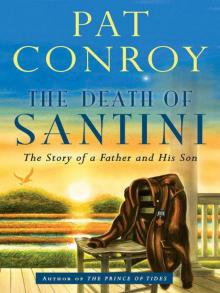 The Death of Santini: The Story of a Father and His Son
The Death of Santini: The Story of a Father and His Son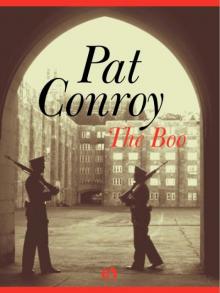 The Boo
The Boo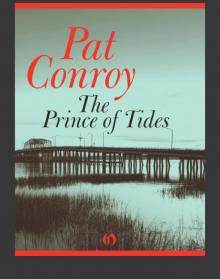 The Prince of Tides
The Prince of Tides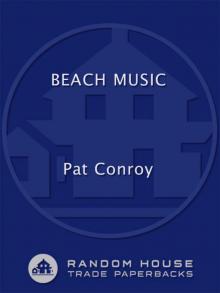 Beach Music
Beach Music The Water Is Wide
The Water Is Wide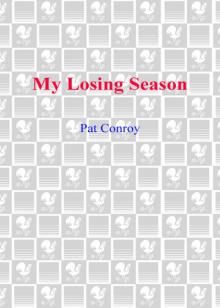 My Losing Season
My Losing Season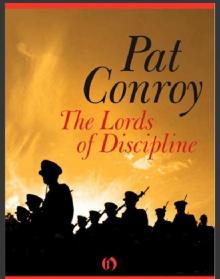 The Lords of Discipline
The Lords of Discipline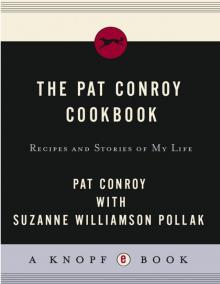 Pat Conroy Cookbook
Pat Conroy Cookbook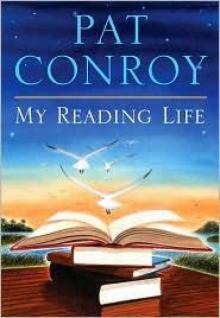 My Reading Life
My Reading Life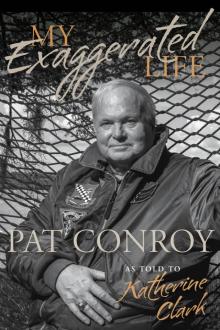 My Exaggerated Life
My Exaggerated Life The Pat Conroy Cookbook
The Pat Conroy Cookbook A Lowcountry Heart
A Lowcountry Heart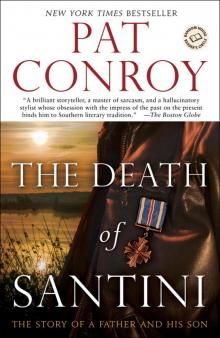 The Death of Santini
The Death of Santini